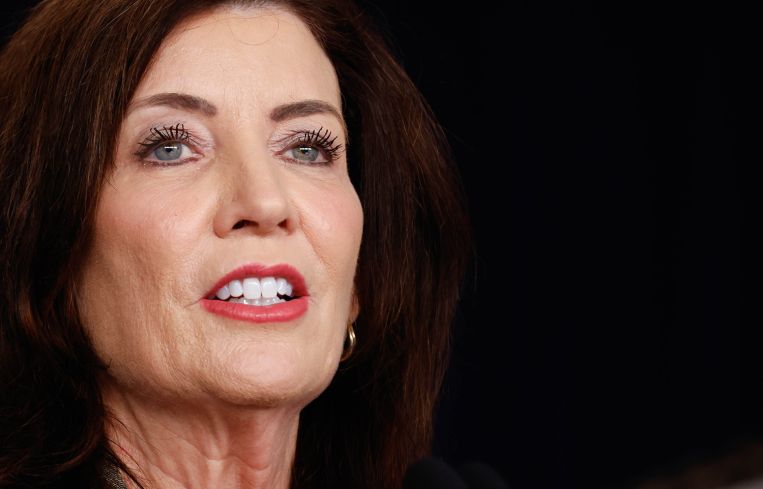Hochul Officially Pauses Congestion Pricing; Advocates See ‘Total Betrayal’
By Mark Hallum June 5, 2024 10:38 am
reprints
Congestion pricing advocates are feeling the sting of betrayal after Gov. Kathy Hochul officially delayed the rollout of the tolling program on Wednesday, weeks before it was set to start.
It surfaced late Tuesday that the governor was considering pushing back the June 30 launch of tolls for cars and trucks entering parts of Manhattan in order to help fellow Democrats in the upcoming election season, sources told both Politico and the New York Times. Hochul also is worried that imposing tolls would hurt the return-to-office efforts of companies in the transit-rich central business district of Manhattan, she confirmed Wednesday.
“I have directed the MTA to indefinitely pause [the congestion pricing] program,” Hochul said in a taped announcement. “This is not a decision I make lightly … but in this moment of financial stress, high inflation and already the high cost of living for so many New Yorkers … I must stand up for them and say no to implementing the congestion pricing toll at this time.”
Instead of instituting the tolling plan to increase the state’s war chest, Hochul reportedly will pitch increasing taxes on New York City businesses instead, according to Crain’s New York Business.
Activist groups, which have been supporting the congestion pricing plan since it was first proposed by former Gov. Andrew Cuomo in 2017, were rattling their sabers morning when news of the delay hit.
“New York City public transit riders gave Gov. Hochul her margin of victory in the 2022 election,” Danny Pearlstein, policy director of the Riders Alliance, said in a statement.
“Stopping congestion pricing before it even starts would be an outrageous betrayal of our trust.”
Pearlstein added that the toll is currently the only financing plan that will bring about a sustainable transit system in the state. Meanwhile, Larry Penner, a former director for the New York office of the Federal Transit Administration (FTA), said the political implications of a delay could have consequences beyond elections.
“Continuing month after month placing the project officially on hold and failure to proceed with advancing the project will eventually result in FTA de-obligating its $3.4 billion in funding and closing out the grant,” Penner said in an email. “The MTA would lose $3.4 billion in discretionary federal funding.
“Never in MTA history has the MTA lost FTA funding due to reneging on providing its legally required matching local share in any approved FTA grant,” Penner added. “MTA Chairman Janno Lieber would be the first MTA chairman to do so and have egg on his face.”
The MTA did not immediately respond to a request for comment.
The state agency approved the pricing structure — $15 per day fee for cars entering Manhattan below 60th Street and $24 or $36 per day for trucks — in March followed by the announcement in April that the start date would be June 30.
“Delaying congestion pricing will only hurt millions of transit riders relying on improvements and hinder the economic success of our broader region,” Kate Slevin, executive vice president of the Regional Plan Association, said in a statement. “It means delays on critical transit projects like the faster service on the A/C line, station upgrades and bus electrification along with all the jobs that they bring. This move is a total betrayal of New Yorkers and our climate.”
Cuomo proposed congestion pricing in 2017 as a solution to the ongoing transit crisis that reached a pinnacle during what he dubbed the “summer of hell.” Two years later, state lawmakers passed legislation approving and obligating the initiation of congestion pricing, but former President Donald Trump’s administration did not advance the proposal.
Once President Joe Biden took office, his administration rapidly approved the 500-page environmental assessment laid out by the MTA.
Ultimately, the toll is expected to generate $15 billion for the MTA’s improvement plans over five years and fund projects like the second phase of the Second Avenue Subway, an extension of the Q train from 96th Street to 125th Street.
Update: This story has been updated to show Hochul officially paused the congestion pricing plan.
Mark Hallum can be reached at mhallum@commercialobserver.com.



